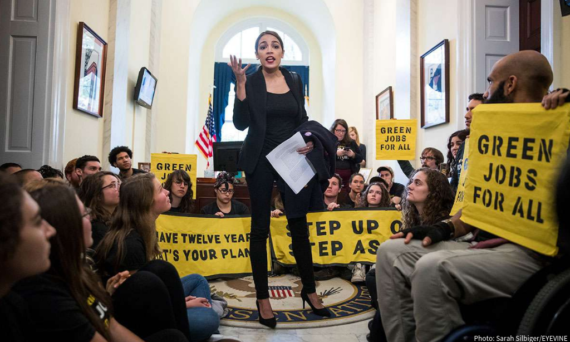The Green New Deal is a chance to address big banks who are financing climate destruction and mass incarceration

There has been a lot of conversation around what a Green New Deal should look like. Many sustainability activists want to focus on decarbonizing the U.S. economy; some labor unions are understandably worried about the loss of fossil fuel jobs; and grassroots climate justice organizations like Sunrise Movement continue to remind us that climate justice cannot be separated from racial justice and immigration justice.
These are three seemingly different objectives: reducing carbon emissions, providing good jobs, and making sure Black communities and other communities of color are not left out of these benefits. But they provide a foundation for building a labor, environmental, and racial justice coalition that few could have imagined only a decade ago.
What do environmental justice, labor justice, and ending mass incarceration have to do with each other?
- A report from 2016 revealed that six banks have played the biggest roles in financing private prison groups in the U.S. Four out of these six banks are also major financiers of pipelines and other fossil fuel projects.
- Some of the private prison investments that are held by these big banks include immigration detention centers.
- Incarcerated people are disproportionately impacted by environmental injustices, since prisons are often built in areas that are environmentally hazardous. Polluted air and poisoned water impact incarcerated people throughout the country.
- Incarcerated people and detained immigrants are disproportionately impacted by wage theft and other exploitative working conditions.
Basically, the same Wall Street banks that are profiting from fossil fuels and mass incarceration, also uphold a prison industrial complex that exploits incarcerated people and detained immigrants for cheap labor.
The public banking movement provides a space for equity advocates working on labor, environmental, and climate justice to join forces. Equitable, triple-bottom-line banking standards can help society migrate capital out of prisons and fossil fuel investments, and into sustainability-focused economic development initiatives. This could create good jobs for Black communities and other communities of color. In addition to a playbook of triple-bottom-line standards like those currently in practice at Beneficial State Bank and in further development at Beneficial State Foundation, a Green New Deal can provide a new mechanism for us to demand better corporate practices from mega banks. And for our elected officials (and the people who they represent) to hold those banks accountable.
Symone is Beneficial State Foundation’s Digital Engagement Manager based in Oakland, CA.
This blog post reflects the author’s personal views and opinions. It does not represent the views and opinions of Beneficial State Bank and/or Beneficial State Foundation.


